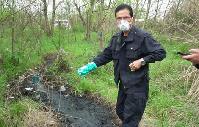Turtle power propels Qinzhou
The turtle market is very sensitive to changes in international politics and economics. His business dropped dramatically in 1998 with the Asian financial crisis. His business also suffered in 2008 because of the global recession led by the US subprime mortgage crisis.
"I have to pay close attention to news about world leaders after looking at my turtles all day," Chen laughs.
"I will not exaggerate the medicinal values of the turtle," says Chen. "It has been a special nutritious herbal cuisine throughout Chinese history."
Chen looks younger than his age, and attributes his wrinkle-free face and vigor to turtle soup, which he has been drinking religiously for a long time.
| Aspirational artist |
| Watching the water |
Qinzhou lies to the south of the Tropic of Cancer at the foot of the east-west Shiwandashan mountain range and to the north of the Beibu Gulf.
The mild temperatures and humidity in Qinzhou makes it ideal for turtles. "We need not spend much money like the turtle breeders in other places such as Jiangsu, Hainan and Hunan to maintain constant temperate and humidity in the turtle's living environment," Chen says.
"We just need to give them food, fresh water, sand and a slope to rest on. The only problem for us is to avoid raising too many turtles in a limited space," says Li Yongshi, an 18-year-old technician who graduated from a local agricultural vocational school and is now working on Chen's farm.
Chen is not only one of the largest employers of agricultural students, but also provides training and help to the jobless and retirees, helping them raise and sell turtles.
In 2004, with the help of the Qinzhou city government, Chen established the Qinzhou Turtle Association, the first of its kind in Guangxi, as a volunteer platform to train people how to breed and raise turtles.
Chen has mature marketing channels and business models. In addition to his own farms, he gives young turtles to the trainees, teaches them how to take care of the reptiles and buys back the grown turtles several years later. As of 2013, more than 6,000 families in Qinzhou had benefited from Chen's program.
He Chuanming, a retired worker in his 60s at Chen's training session, says: "Chen feels grateful to turtles that changed his life. He believes he should allow more needy people in Qinzhou to benefit from the business."
More than 10,000 Qinzhou families raise 1.25 million turtles in their homes at present. The annual production value of these families reached more than 500 million yuan in 2012. The average annual net income per family is about 20,000 yuan. The city sells about 1,500 tons of turtle each year.
"As Guangxi and Beibu Gulf have special positions in China's integration with the ASEAN countries, I am confident turtle farming in Qinzhou will have new business opportunities from new markets. We need to develop it into an industry by successfully processing turtle products," says Chen.
Huo Yan contributed to the story.
For more China Face, here


















